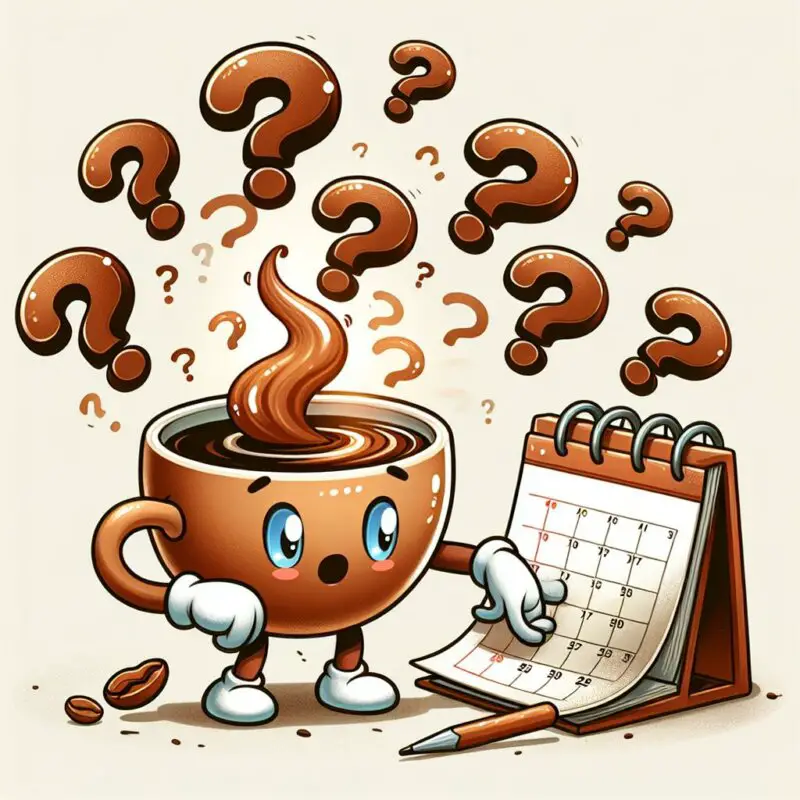This post may contain affiliate links. Please read my disclosure for more info.
At some point, we all lean on coffee for a wake-up call. It’s our go-to for energy, whether we’re tackling a busy day or facing a tight deadline. But sometimes, that caffeine boost just doesn’t work, leaving us puzzled. Why doesn’t coffee wake us up when we need it most?
Your coffee buzz might not hit the same because of your habits, genes, how you’re feeling, and how you make your coffee. Things like getting used to caffeine, having a quick metabolism, feeling tired or dehydrated, your sugar intake, the kind of coffee bean, and how you brew it can all play a part.
Before we dive deep, let’s explore how coffee actually keeps us alert. Stay tuned for detailed reasons later in this article.
Why Does Coffee Wake You Up?
Caffeine in coffee beans naturally perks you up, making your morning cup essential.
This magic ingredient latches onto parts in your brain, stopping sleepiness signals. So, your brain activity kicks up a notch, leaving you feeling awake and full of energy.
How long does coffee keep you awake?
Coffee does more than just kickstart your day; it has the power to keep you awake for hours. That’s because your body holds onto caffeine for quite some time. On average, the half-life of caffeine is around 5 hours. This means about half the caffeine you drink stays in your bloodstream for that long.
When you drink coffee, your body starts soaking up the caffeine in just 45 minutes. This caffeine buzz can last up to 10 hours, making you feel more awake. However, remember, everyone’s body reacts differently to caffeine!
Caffeine affects everyone differently. Some might stay awake till the next morning, while others barely notice its buzz. The duration of caffeine’s effect varies based on your genes, daily habits, and current state.
The caffeine in your cup changes with your brewing method, the beans you choose, and any extras you mix in. It’s all about how you make your coffee!
Caffeine sticks around in your body, keeping you awake when you’d rather be sleeping. To avoid tossing and turning, enjoy your coffee early in the day and don’t overdo it. This way, you’ll ensure a peaceful night’s sleep.
Why Doesn’t Coffee Keep You Awake?
Coffee’s caffeine can perk you up, but it doesn’t work the same for everyone. Let’s explore why coffee might not always keep you awake.
1. You have developed caffeine tolerance
Sipping coffee daily can make caffeine less effective, leading to a tolerance. This means you might not feel that energy kick you’re after, but rather, hardly notice any effect.
Drinking various coffee types regularly means caffeine keeps blocking signals that make you feel sleepy. Over time, your body makes more of these signal senders to overcome this block. As a result, your morning cup might not keep you as alert as before.
To lower your caffeine tolerance, try cutting back on your daily caffeine or switch to decaf coffee. But, watch out for withdrawal symptoms such as headaches, nausea, and muscle pain in the first day.
2. You have a fast metabolism
Everyone processes caffeine differently. For some, a quick cup doesn’t pack the expected punch, while others might feel jittery from just a single sip. Learn more about coffee jitters and why they happen.
Your genes affect how fast you process caffeine, but smoking, certain meds, and your environment can speed it up too.
3. You are dehydrated
When you’re dehydrated, your blood doesn’t flow well, making you feel tired and sluggish. If you drink coffee while dehydrated, it might not wake you up or sharpen your focus as much as you’d hope.
If you’re feeling dehydrated, swap your coffee for water. After rehydrating, your coffee will give you that caffeine boost more effectively.
4. You’re too tired
When you feel tired and sleepy, it’s because sleep chemicals have taken hold in your body. At this point, caffeine can’t block these signals or wake you up.
Taking a quick 15-20 minute nap can refresh your body’s ability to feel more awake from caffeine, as it clears the way for it to work better. But remember, it’s important to choose when to rest, or your body will decide for you.
5. You’re putting too much sugar in your coffee
Sipping on frappes and Frappuccinos? They mix sugar with coffee to cut the bitterness. But beware, too much sugar can dull caffeine’s kick, leaving you less buzzed.
Adding sweeteners to your coffee can cause a quick sugar rush, followed by a sudden crash, making you feel tired. Even the caffeine in your coffee might not be enough to fight off the sleepiness that comes after.
Luckily, you can still enjoy sweet coffee without sugar. Check out these healthy alternatives that keep your coffee delicious and give you a healthy energy kick.
6. Your coffee is under-extracted
How you make your coffee affects its caffeine level. Brew it wrong, and you’ll get less caffeine to fight off sleepiness.
To boost your coffee’s caffeine kick, simply grind your beans finer, let them steep a bit longer, tweak the brewing heat, or change the ratio of coffee to water when you brew.
7. You need a different brewing method
Different coffee-making methods give you varying levels of caffeine. So, the buzz you get from one cup might be weaker than your usual. This means you might not feel as awake as you’d like.
Looking for a caffeine kick? Try making stronger coffee by changing your brewing method. Using a good espresso machine, you can get an ounce of espresso packed with about 65 mg of caffeine—way more than the 16 mg found in regular coffee. It’s a simple switch for a big boost!
When you measure the same amount, espresso packs more caffeine punch than regular coffee. Remember, the FDA suggests staying under 400 mg of caffeine daily to keep it safe for your health.
8. You need more caffeinated coffee beans
Different coffee beans have different levels of caffeine. This means the type of bean you choose affects how much energy boost you’ll get from your coffee. Remember, beans with less caffeine give a milder kick.
Want a day full of energy and focus? Skip the decaf coffee beans. They’re processed to strip away almost all their caffeine – over 97%! Without it, you might not feel as sharp or awake as you would with regular beans.
Dive into the world of coffee with Arabica and Robusta beans! These beans are not just popular; they pack a punch with up to 1.7% and 2.5% caffeine, respectively. Perfect for those who love their coffee with a strong, delicious kick. Find them in highly caffeinated coffees and start your flavorful journey!
Best Coffee to Wake You Up
Starting your day right can be tough without the ideal cup of coffee. Luckily, you don’t have to wonder about which coffee will give you that morning boost. Check out this quick guide to the best wake-up coffees.
Espresso shots
Espresso packs a punch in a tiny cup, with 65 mg of caffeine that can kickstart your day. But if you need a bigger boost, most of us require 100 to 200 mg of caffeine to truly wake up. That’s where a double espresso, carrying around 130 mg of caffeine, comes in handy to keep you energized.
Just like with regular coffee, you can control how much caffeine you get in your espresso. This is true even if you’re using a Nespresso machine or an affordable espresso machine. The amount of caffeine in Nespresso pods and espresso beans can differ a lot.
AeroPress concentrated coffee
Discover the AeroPress, an affordable gem in the coffee world. It brews a rich coffee concentrate with at least 110 mg of caffeine in just 6 ounces, perfect to energize your day.
If a 6-ounce AeroPress coffee isn’t enough for you, try making it 8 ounces. This will give you about 130 mg of caffeine, which is as much as you’d get from a double espresso!
Cold brew coffee
Discover the wonders of cold brew coffee, a top choice for those who love a strong caffeine kick. This method involves steeping coffee in cool water for 12 hours, creating a concentrate that packs a whopping 500 mg of caffeine in just 8 ounces – five times more than a standard cup of coffee!
Thinking of sipping cold brew as is? Try adding water to lighten it or mix in some nitrogen for a creamy, delightful nitro cold brew at home instead.
Discover how to craft delicious cold brew coffee in your kitchen! Check out these simple guides for using an AeroPress and a French press to get started.
Red-eye coffee
Discover the power of red-eye coffee: a bold blend of drip coffee and espresso. With 95 mg of caffeine from the drip and an additional 65 mg from the espresso, each cup delivers a whopping 160 mg caffeine kick. Perfect for those who need a serious wake-up call!
Struggling to wake up? Swap your red-eye for a black-eye coffee with a double shot of espresso, or go for a triple shot and sip on a green-eyed coffee. These power-packed brews have up to 3 times the caffeine of regular coffee. If these don’t get you going, nothing will!
Frequently Asked Questions
How late is too late for coffee?
CNBC recommends no caffeine intake after 3 pm to avoid sleep loss resulting from residual caffeine in your blood. However, it’s still up to you if you’ll be sticking to their suggestion.
After all, you always have the option of decaf. Not only can you have coffee after dinner with your peers, but you also won’t be missing a wink of sleep.
Does coffee affect sleep?
Yes, coffee can disrupt your sleep patterns and cause insomnia in some cases. This event is due to caffeine blocking signals of sleepiness within your body. In turn, you feel energized even during your bedtime.
Up and Running with Coffee!
When your coffee isn’t waking you up, it can lead to a disaster – like missing deadlines, snoozing through meetings, and feeling tired all day. But don’t worry! A few simple changes in your lifestyle and coffee routine can make a big difference.
Starting your coffee journey begins with knowing the basics and having the right tools. Before spending too much, peek at my affordable coffee maker guide. Or, if brewing at home seems daunting, why not explore the boldest Starbucks coffees instead of trying to make it strong on your own?
What’s your favorite coffee for a quick energy boost? Share in the comments below!




